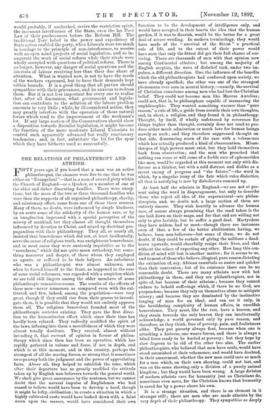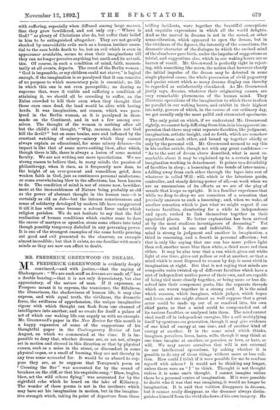THE RELATIONS OF PHILANTHROPY AND ATHEISM.
FIFTY years ago, if you beard that a man was an active philanthropist, the chances were five to one that he was either an "Evangelical "—that is, a man of avowed piety within the Church of England—or a Quaker, or a member of one of the older and richer dissenting families. There were excep- tions, bat the mass of the two or three thousand families who were then the supports of all organised philanthropy, charity, and missionary effort, came from one of those three sources. Many of them, no doubt, were influenced by simple kindness, by an acute sense of the solidarity of the human race, or by an imagination impressed with a special perception of the misery of mankind, but they almost all thought themselves influenced by devotion to Christ, and mixed up doctrinal pro- pagandism with their philanthropy. They all, or nearly all, insisted that benevolence which did not, at least incidentally, serve the cause of religious truth, was unrighteous benevolence, and in most cases they were anxiously inquisitive as to the "soundness," which did not quite mean orthodoxy, but some- thing narrower and deeper, of those whom they employed as agents, or suffered to be their helpers. An unbeliever who was a philanthropist was almost unknown, and when he forced himself to the front, as happened in the case of some social reformers, was regarded with a suspicion which we are told still lingers among the older members of some philanthropic committee-rooms. The results of the efforts of these men—never numerous as compared even with the cul- tivated, and few, indeed, among the population—were very great, though if they could rise from their graves to investi- gate them, it is possible that they would not entirely approve them all. The religious benevolent founded most of the philanthropic societies existing. They gave the first direc- tion to the humanitarian effort which since their time has hardly been relaxed. They radically modified the spirit of the laws, infusing into them a mercifulness of which they were almost totally destitute. They created, almost without intending it, that current of opinion in favour of philan- thropy which since then has been so operative, which has rapidly gathered in volume and force, if not in depth, and which is at this moment, and in this country, perhaps the strongest of all the moving forces, so strong that it sometimes sweeps away both the judgment and the power of appreciating facts. Above all, they helped to establish the tone, which after their departure has so greatly modified the attitude taken up by English non-believers towards the general world. We shall give great annoyance by the sentence, but we cannot doubt that the natural impulse of Englishmen who had ceased to believe would have been to develop a hard, though it might be lofty, civilisation; to create a situation in which a highly cultivated caste would have looked down with a faint scorn upon the masses, would have considered their own
function to be the development of intelligence only, and would have accepted in their hearts the idea that the human garden, if it was to flourish, would be the better for a great deal of severe weeding. In modern terminology, they would have made of the "survival of the fittest" a practical rule of life, and to the extent of their power would have seen that only the fittest did get their full chance of sur- viving. There are thousands of men with that opinion now among Continental atheists ; but among the majority of English sceptics, the wave of disbelief took, under two im- pulses, a different direction. One, the influence of the benefits which the old philanthropists had conferred upon society, we have already specified; the other was one of the strangest phenomena ever seen in mental history,—namely, the survival of Christian conscience among men who had lost the Christian belief. They could not become men like Marcus Aurelius ; could not, that is, be philosophers capable of massacring the unphilosophic. They wanted something warmer than "pure reason," a rule of life, a guide from outside their own thoughts, and, in short, a religion, and they found it in philanthropy. Thought, by itself, if wholly unfettered by reverence for things higher than thought, certainly does not tend to pro. duce either much admiration or much love for human beings merely as such ; and they therefore suppressed thought on that side, denouncing scorn of the race with a vehemence which has actually produced a kind of obscurantism. Misan- thropes of high powers must exist, but they hold themselves back from observation ; and the man who preached that nothing can come or will come of a feeble race of ephemerides like men, would be regarded at this moment not only with dis- favour as a thinker, but with a cold distrust and dislike as a secret enemy of progress and "the future,"—the word in which, by a singular irony of the fate which rules dialectics, all that is satisfying is now by disbelievers summed up.
At least half the atheists in England—we are not at pre- sent using the word in disparagement, but only to describe those who reject all idea of the supernatural—are philan- thropists, and, we doubt not, a large section of them are entirely sincere. They wish heartily to advance the human race, of course always premising that the road taken is the one laid down on their maps, and for that end are willing not only to give lavishly, bat to suffer a good deal. Martyrdom they have seldom had to meet—though there are instances even of that, a few of the hotter abolitionists having, we believe, been non-believers—but some of them, we do not doubt, if they could be certain of giving the millions a dead- heave upwards, would cheerfully resign their lives, and that without the solace of expecting any other. How long this con- dition of mind will last is another matter; for it seems to us, and to most of those who believe, illogical, pure reason dictating the extinction of, say, African cannibals as easier and quicker than their conversion ; but of its existence there can be no reasonable doubt. There are many atheists now with hot philanthropy in them, and they are philanthropists, not in spite of, but because of their atheism ; because they cannot endure to behold sufferings which, if there be no God, are purposeless; because they rely on themselves alone to mitigate misery ; and because they are dominated by the instinctive longing of man for an ideal, and can see it only, in the bewildering complexity of human affairs, in unselfish benevolence. They must, like the rest, have a heaven, and they strain towards the only heaven they can intellectually acknowledge, a world governed only by pure reason, and therefore, as they think, free of poverty, pain, and foolishness alike. They put poverty always first, because when one is attacking a fortress, one wants forces, and there is always a blind force ready to be hurled at poverty ; but they hope by slow degrees to be rid of the other two also. The earlier philanthropists, who believed that men have souls, would have stood astonished at their vehemence, and would have doubted, in their amazement, whether the new men could care so much for a race which, on their own showing, could not last, and was on the same showing only a division of a purely animal kingdom ; but they would have been wrong. A large division of modern atheists care for humanity just as Christians do, sometimes even more, for the Christian knows that humanity is cared for by a power above his own.
It is a strange situation, and there is an element in it stranger still ; there are men who are made atheists by the , very depth of their philanthropy. They sympathise so deeply with suffering, especially when diffused among large masses, that they grow bewildered, and not only cry : "Where is God?" as plenty of Christians also do, but suffer their belief in him to be extinguished altogether. They are not greatly shocked by unavoidable evils such as a human instinct essen- tial to the race holds death to be, but an evil which is even in appearance avoidable, seems to stun their imaginations till they can no longer perceive anything but earth and its actuali- ties. Of course, in such a condition of mind, faith, momen- tarily at all events, departs. The creed of the Berlin woman : "God is impossible, or my children could not starve," is logical enough, if the imagination is so paralysed that it can conceive of no purpose to which momentary pain is essential ; no life in which this one is not even perceptible ; no destiny so supreme that, were it visible and suffering a condition of attaining it, we should all be crowding to suffer, as the Zulus crowded to kill their oxen when they thought that those oxen once dead, the land would be alive with lowing herds. It was imagination, not reason, which was para- lysed ha the Berlin woman, as it is paralysed in thou- sands on the Continent, and in not a few among our- selves. The thought of the woman is nothing after all but the child's old thought, "Why, mamma, does not God kill the devil?" but on some brains, sore and inflamed by the constant watching of misery—misery which they cannot always explain as educational, for some misery debases—its impact is like that of some nerve-cutting blow, after which, though there is life, there is always a lesion of some mental faculty. We are not writing out mere speculations. We see strong reason to believe that, in many minds, the passion of philanthropy, when it rises, as it frequently now does, to the height of an ever-present and remediless grief, does weaken faith in God, just as continuous personal misfortune, or some overwhelming blow to the affections, has been known to do. The condition of mind is not of course new, bewilder- ment at the inexorableness of Nature being probably as old as the power of abstract thought in the human race—it is certainly as old as Job—but the intense consciousness and sense of solidarity developed by modern life have exaggerated it till it has with some become a solvent force under which religion perishes. We do not hesitate to say that the full realisation of human conditions which excites some to dare the career of martyrs or apostles, stuns some others into total though possibly temporary disbelief in any governing power. It is one of the strangest examples of the same bottle pouring out good and evil presented to the observer, an example almost incredible ; but that it exists, no one familiar with men's minds as they are now can affect to doubt.







































 Previous page
Previous page